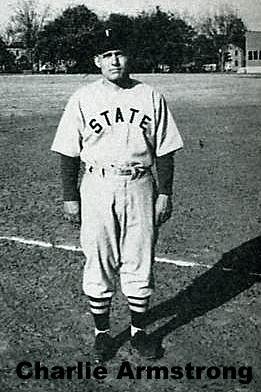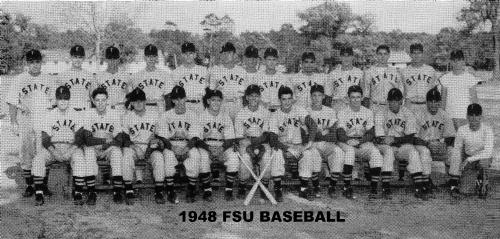Remembering Charlie Armstrong
By Jim Joanos
Florida State has begun another baseball season. It is an appropriate time to honor Charlie Armstrong, its first baseball coach of modern times. Armstrong, who died this past December, was a major contributor in establishing the FSU men's athletics program and played major roles in two of its sports.
 |
In early 1948, Charlie Armstrong, at the request of new head football coach, Don Veller, was hired to teach and coach at FSU. At the time, the school was in the midst of its first year as "Florida State University". FSU had been a women's college from 1905 until 1947. To make room for GI's returning from World War II service, the institution had been converted into a coeducational university and given its new name. Along with the other changes, FSU was beginning a men's athletics program involving six sports, among them football and baseball.
In the Fall of that school year (1947-48), FSU had fielded its first football team under makeshift circumstances. Shortly after the season ended, FSU hired Veller to be its new head football coach. As Veller was in the midst of finishing up his PhD program at the University of Indiana, he could not at first get away full time to go to Tallahassee. Consequently, Charlie Armstrong and his twin brother, Bill, both of whom had been football players at Indiana where Veller was an assistant coach, were hired to come to Tallahassee as assistant football coaches and immediately conduct Spring football practice. In addition to his demanding duties involving football and teaching, Charlie was soon charged with the responsibility of creating a baseball program for FSU and serving as its first head coach.
 |
He started the baseball program from scratch. Although the City of Tallahassee's Centennial Field, formerly a professional minor league facility was available occasionally for games, FSU had to have a place to practice and play when that venue was not available, so a baseball field had to be built. A site on FSU's West Campus (land and facilities being temporarily utilized by the university which had been the site of the former World War II Dale Mabry Field air base) was chosen and work began. One of the first FSU ballplayers, Ron Nettles, who resides in Tallahassee, recalls the hard work working side by side with maintenance workers to build that field. He recalls "laying out the field and putting up the backstop" as well as "setting up bleachers." A call went out to the student body for players to report and soon the team was practicing. A limited amount of money was made available for uniforms and some equipment but the players individually had to provide their own shoes and gloves. Armstrong, only a couple of years older than a number of players, as they were military veterans also, had to learn as he went. Some of the more knowledgeable players helped with the coaching of others. Soon they were playing. They won their first game against Mississippi College and went on to a 9 win and 8 loss first season, establishing the tradition that continues to exist in that FSU baseball has never had a losing season.
Armstrong would serve in both capacities as an assistant football coach and head baseball coach for four years. He did a good job in both capacities. During his four years the football team won 30 of its 34 games including FSU's first bowl win against Wofford College in the 1949 Cigar Bowl. The baseball team during those same four school years won 46 games and lost 29.
Born in 1922 in Evansville, Indiana, Armstrong was in school at Evansville College in 1941 when Pearl Harbor was bombed. Soon he was flying B-24 bombers in missions over Germany and on D-Day and thereafter elsewhere over Europe. When the war ended, the war hero, entered Indiana University to finish his college education and played football on the 1945 Big Ten championship team. He was finishing up at Indiana when Veller hired him to come to FSU.
While coaching and teaching at FSU, Armstrong retained his status in the United States Air Force Reserves, consequently when the Korean War came, in 1951 he was recalled to active duty and soon he was flying again, this time B-47's for the Strategic Air Command and teaching other officers how to fly them.
When his second tour of active military duty ended, he turned to high school coaching and teaching in Florida. Among the high schools where he taught and coached were Quincy Shanks, Tallahassee Lincoln, Monticello Jefferson, and Pensacola Washington. In 1994, Armstrong was inducted into the FSU Athletics Hall of Fame. He died at age 87 in Tallahassee where he spent his retirement years leaving his wife of 62 years, Milly. The Armstrongs have four children, twelve grandchildren and six great-grand children. Charlie Armstrong was truly a major contributor to the success that FSU Athletics has enjoyed.